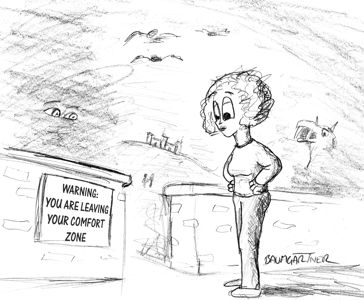
Want to Be Creative? Step Back into Your Comfort Zone
By Jeffrey Baumgartner
If you want to be creative, you've got to step out of your comfort zone, right?
Wrong!
If you look at the great authors, artists and composers throughout history, you will see that they almost universally worked in their offices or studies and often kept strict routines. (For examples, see here and here). In other words, they not only worked within comfort zones, but they cultivated very comfortable comfort zones. You should do the same when you need to be creative. But first, it helps to understand what a comfort zone is.
In his paper, "From Comfort Zone to Performance Management" Alasdair White, defines a comfort zone as
The comfort zone is a behavioural state within which a person operates in an anxiety-neutral condition, using a limited set of behaviours to deliver a steady level of performance, usually without a sense of risk.
In a nutshell, then, a comfort zone is an environment or situation where you minimize anxiety.
Where Are You Most Creative?
Now think about where you are most creative. Typical answers might include taking a walk (my preferred method), taking a bath or relaxing in your favourite armchair. These are all very comfortable, familiar and (hopefully) low anxiety places! From a creative perspective, that makes sense. When you are comfortable and unthreatened, you can relax and your mind can wander. This happens to be the ideal creative thinking mode in part because it allows your mind to relax which, in turn allows it to (1) make the kind of unexpected connections that result in creative ideas and (2) it relaxes its censorship mode, allowing more unusual ideas to take shape than it normally does.
If, on the other hand, you are in an even slightly anxious state, it is likely that your mind will stop relaxing, focus more and censor unusual thinking more severely.
Does this mean that stepping out of your comfort zone is a bad thing? Not at all!
Optimal Anxiety
You should regularly get out of your comfort zone, but not when you want to be creative. Getting out of your comfort zone generally results in new experiences and learning. This provides your mind with raw material that can be used to formulate creative ideas when you are relaxed in your comfort zone.
Moreover, it seems people tend to be most productive when they are out of their comfort zone, but not in a high anxiety situation; a state called "optimal anxiety". Although people work at a steady level of anxiety in their comfort zones, they seem to push harder and learn better in when in a state of optimal anxiety.
Dance In to and Out of Your Comfort Zone
What all this means is that it is important to step out of your comfort zone regularly in order to gain new experience, new perspectives and new insights (so be sure to keep a notebook with you all the time, so you can capture inspired thoughts). However, when it comes time to use your imagination to be constructively creative, it is usually best to find your most comfortable of comfort zones and set your mind free.




